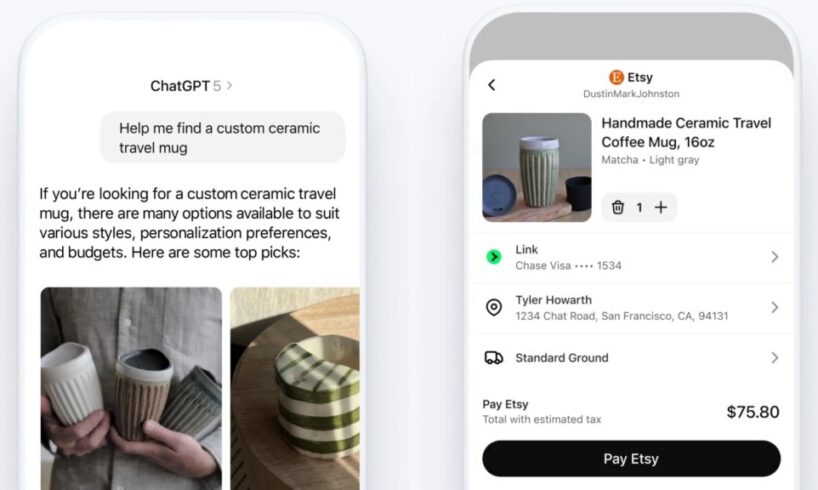
OpenAI will let ChatGPT users find and purchase products entirely within the AI chat interface, offering new ways for e-commerce businesses to gain and retain paying customers while challenging the likes of Google, Meta, and Amazon.
Related Article Block Placeholder
Article ID: 323995
Overnight, OpenAI revealed its partnership with payments giant Stripe on what it dubs Instant Checkout, a system allowing ChatGPT users to ask for product recommendations, confirm their order, provide shipping information, and finalise purchases without visiting the retailer’s website.
Orders, payments, and shipping are all handled by the merchant’s existing backend systems, with Instant Checkout connecting to different e-commerce tools through what OpenAI and Stripe call the Agentic Commerce Protocol.
Instant Checkout is initially available to US users on the Plus, Pro, and Free plans, and works for all businesses hosted on Etsy.
Shopify integration is coming, and OpenAI will expand Instant Commerce to more regions in the months ahead.
Smarter business news. Straight to your inbox.
For startup founders, small businesses and leaders. Build sharper instincts and better strategy by learning from Australia’s smartest business minds. Sign up for free.
By continuing, you agree to our Terms & Conditions and Privacy Policy.
Instant Checkout is free for shoppers to use, but OpenAI said merchants will pay a “small fee” for each product purchased through the system.
The announcement faced immediate market support, with shares in Etsy and Shopify surging on the news.
Although Instant Checkout is yet to launch in Australia, e-commerce experts believe the launch is a significant moment for businesses selling their products online.
Carla Penn-Kahn, the founder of ProfitPeak, a SaaS helping e-commerce brands increase their profitability, says younger customers could be particularly receptive to Instant Checkout.
“If your customers are living and breathing TikTok today, they are OpenAI-native first,” she told SmartCompany.
Related Article Block Placeholder
Article ID: 323833
For the growing number of habitual ChatGPT users, “the Google Search engine doesn’t exist”, she said.
This means that “instead of relying heavily on Meta and Google as a source of traffic, OpenAI will obviously become a dominant, I suspect, source of traffic” for many e-commerce brands.
“So it’s a new channel to market, another media channel to invest in.”
No need to abandon what works
Despite its promise, the experts warn against abandoning traditional search engine optimisation and social media ad campaigns to ‘hack’ those ChatGPT results.
“It’s very easy to fall for the black and white fallacy where it’s either gonna be Google keywords or ChatGPT,” said Iain Calvert, founder of consultancy Boom Ecommerce.
OpenAI still draws from data available on the open web, meaning “80 or 90% of what you do for SEO gets you into ChatGPT,” he said.
Instead of ditching established practices, “first movers” could indirectly boost their OpenAI brand performance by proactively responding to customers on forums like Reddit, said Penn-Kahn.
Celia Harding, founder and director of Leoprd, a PR agency focused on AI discoverability, agreed that a ‘traditional’ online presence still matters.
“ChatGPT doesn’t rank you based on what you say about your products; it evaluates external signals of quality and credibility,” she said.
And while Stripe’s leaders — including co-founder John Collison — have questioned the role of websites in an agentic AI landscape, there is no need for brands to ditch their digital storefronts just yet.
“I don’t think websites are going to go away, like retail stores didn’t go away when e-commerce came about,” said Calvert.
E-commerce experts forecast advertising fees
OpenAI did not detail costs for merchants outside of the “small” transaction fees, but Calvert expects paid ads and product placements to become a major part of ChatGPT’s Instant Checkout system.
“When Facebook first came out… you and I would post our holiday photos, or a business would post new products, and you would get lots of traffic,” said Calvert.
“So it brings everybody together.
“And then once they’ve got a captive audience, they then remove that free reach, and then they start to charge you to run ads.
“I would guess that OpenAI is going to do something similar.”
Penn-Kahn agreed, saying OpenAI’s potential advertising revenue would far outstrip the fees merchants pay each time an Instant Checkout transaction is approved.
“That merchant fee is not how they’re going to make their money,” she said.
“They’re going to make their money from ads.”





